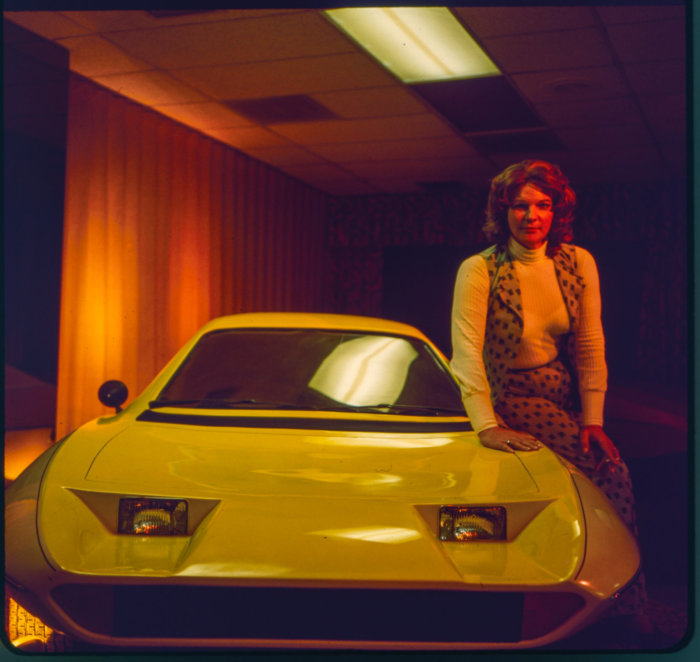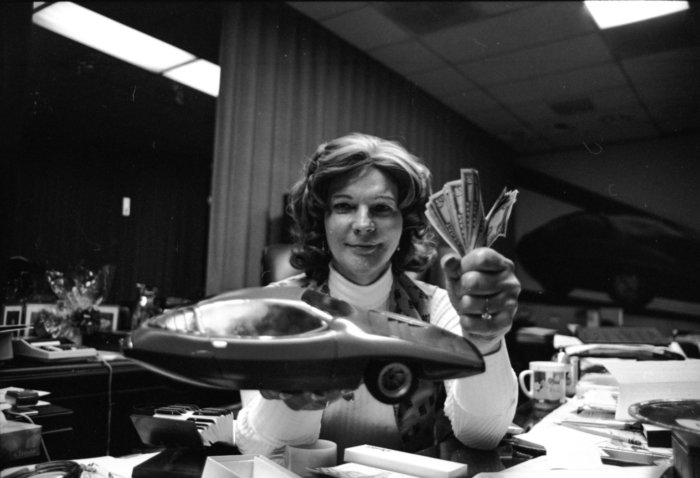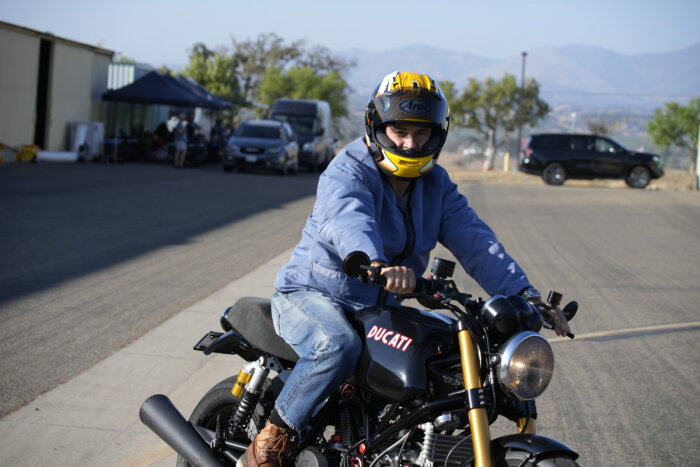Liz Carmichael was many things, but most notably the force behind the 1970s, three-wheel, fuel-economic Dale car that was going to revolutionize the automobile industry and stick-it to Detroit’s “Big Three” – General Motors, Chrysler and Ford.
This lightweight, fuel-efficient, super-safe and affordable car was going to be the solution that the U.S. needed for the 1973 oil crisis, during which political tensions led to an oil embargo between the Middle East and U.S. that, when lifted, saw global oil prices rise by 300%.
Liz Carmichael was also a trans-woman who was born Jerry Dean Michael, in 1937. She had a wife, Vivian, and five kids. Her neglected story is being told in an upcoming HBO docu-series, “The Lady and the Dale,” and Metro recently spoke to co-directors Nick Cammilleri and trans artist and LGBTQ+ activist, Zackary Drucker.

When you Google Liz Carmichael, barely any information comes up, despite the almost unbelievable arc and achievements of her life and her grand aspirations for the future of the auto-industry.
When asked about this scarcity of information and how they came across Liz’s life story, Cammilleri replied he became fascinated with her after watching a 1989 episode of “Unsolved Mysteries,” which led to a desire to investigate the story of this underrepresented trans-figure. He spent almost a decade digging up what archives he could and getting to know Liz’s family and people who knew her.
Surprisingly, Drucker who is an expert in trans-history, had not heard of Liz until one-and-a-half years ago. Drucker puts this down to the “erasure that trans people have always been vulnerable to.” And this superbly animated, well-structured and lively docu-series certainly makes this level of trans-history marginalization alarmingly clear.
Liz’s three-wheeler car form was formed around the premise that the lighter a car, the less gas needed, “We eliminated 300 pounds (136kg) by removing the front wheel,” which Liz claimed would lower the purchase price of the car, as she started her company Twentieth Century Motors.
Many other claims were made of Dale when trying to promote the car and attract investors. Not only was it the most fuel-efficient car in existence, it was also the “safest in the world,” nine times stronger than steel per ounce, made of unbreakable plastic and bulletproof.
The latter claim certainly proved not to be true, and perhaps a few of the others too – we’ll never really know what the Dale could have been, because Liz never got much of a chance to experiment. One truth is that Liz was trying to do in months what it had taken The Big Three decades to achieve:
“I don’t want to sound like an egomaniac but I’m a genius. We’re going to fill a hell of an important gap in the car market. Once people see how the Dale performs, the only problem will be keeping up with demand,” stated Liz.
When Cammilleri was asked if there was an element of delusion to Liz’s character he replied, “you have to be delusional to be an entrepreneur, you have to be the only person who believes in what you’re doing because everyone else is going to doubt you. And it doesn’t exist before it exists. You have to will this thing into creation.”

Unfortunately, a rushed test drive with an unfortunate outcome led to the withdrawal of investors and the Dale dream died.
By this point, Liz had already taken deposits for her car – master of publicity that she was, and of course, these people never got their money back. Liz spent time in a men’s prison where she was horrifically beaten.
Pre-transition, Liz had committed a number of petty crimes such as check forgery, and even with the dale she had a self-stated business mentality that “It’ll be legal – but just.”
When asked where Liz fits into the world of public trans-figures, given her brushes with the law, Druker does not hesitate to leap to her defense, seeing her as “a genius survivor” whose “resilience was a testament to the capabilities of trans people to survive against all odds.”
Indeed, with no medical options in the U.S. to transition, Liz would go to Mexico, inject herself with hormones and taught herself to speak in a more “womanly fashion” by listening to and imitating taped recordings. Drucker regards her ability to do this in the 70s as inspirational in and of itself, describing her as “indomitable.”
When asked about his views on Liz, Cammilleri states, “This isn’t hyperbole. Liz is probably the toughest woman I’ve heard of in my life. She was resilient; she never, ever stopped and had more courage than most people in the world.”
Drucker and Cammilleri are making an important contribution to trans-history with “The Lady and the Dale,” by working to help Liz Carmichael assume her place as a trans-hero, with a complex human story and authentic, relentless selfhood.
In her words, “I have no problem being a woman in a man’s world – because I can out think ‘em, out talk ‘em and out cuss ‘em.”
“The Lady and the Dale” is available on HBO and HBO Max.
































